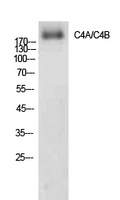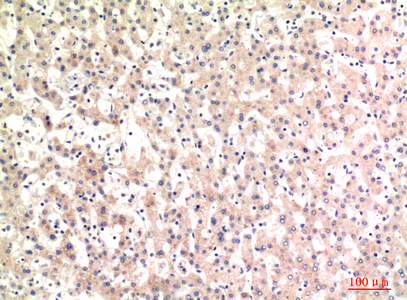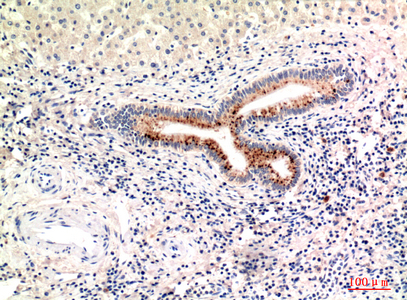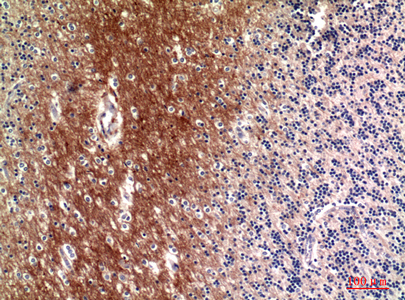



| WB | 咨询技术 | Human,Mouse,Rat |
| IF | 咨询技术 | Human,Mouse,Rat |
| IHC | 1/50-1/100 | Human,Mouse,Rat |
| ICC | 技术咨询 | Human,Mouse,Rat |
| FCM | 咨询技术 | Human,Mouse,Rat |
| Elisa | 1/10000 | Human,Mouse,Rat |
| Aliases | C4A; CO4; CPAMD2; Complement C4-A; Acidic complement C4; C3 and PZP-like alpha-2-macroglobulin domain-containing protein 2; C4B; CO4; CPAMD3; Complement C4-B; Basic complement C4; C3 and PZP-like alpha-2-macroglobulin domain-containing protein 3 |
| Entrez GeneID | 720/721 |
| WB Predicted band size | Calculated MW: 193 kDa; Observed MW: 180 kDa |
| Host/Isotype | Rabbit IgG |
| Antibody Type | Primary antibody |
| Storage | Store at 4°C short term. Aliquot and store at -20°C long term. Avoid freeze/thaw cycles. |
| Species Reactivity | Human |
| Immunogen | The antiserum was produced against synthesized peptide derived from the Internal region of human C4A/C4B. AA range:721-770 |
| Formulation | Purified antibody in PBS with 0.05% sodium azide,0.5%BSA and 50% glycerol. |
+ +
以下是关于C4A/B抗体的3篇参考文献的简要概括:
---
1. **文献名称**:*The role of complement C4A and C4B gene variants in autoimmune diseases*
**作者**:Christoph Q. Schmidt, et al.
**摘要**:探讨C4A和C4B基因多态性与系统性红斑狼疮(SLE)等自身免疫病的关系,研究其抗体在疾病中的检测价值及补体激活途径的调控机制。
2. **文献名称**:*C4A and C4B antibodies in the diagnosis of neuropsychiatric lupus*
**作者**:Laura A. Korb, et al.
**摘要**:分析C4A/B抗体在神经精神性狼疮(NPSLE)中的特异性表达,提出其作为生物标志物在鉴别诊断中的应用潜力,并比较不同检测方法的敏感性。
3. **文献名称**:*Structural and functional characterization of monoclonal anti-C4 antibodies*
**作者**:John P. Atkinson, et al.
**摘要**:报道针对C4A和C4B的单克隆抗体制备及功能验证,揭示两者在补体经典/凝集素途径中的差异结合特性,为治疗补体相关疾病提供工具。
---
注:以上文献信息为示例性概括,实际引用需以具体论文为准。建议通过PubMed或Google Scholar以关键词“C4A/B antibody”或“anti-C4A/B”检索最新研究。
C4A and C4B are two closely related isoforms of complement component 4 (C4), a critical protein in the complement system’s classical and lectin pathways. These isoforms arise from genetic duplication and share over 99% sequence homology, differing primarily in a single amino acid residue (C4A has an aspartic acid, while C4B has a histidine at position 1101). This subtle variation affects their biochemical activity: C4A preferentially binds to amino groups (e.g., immune complexes), while C4B interacts with hydroxyl groups (e.g., pathogen surfaces), influencing their roles in immune clearance and inflammation.
C4A/B antibodies are immunological tools used to distinguish between these isoforms in research and diagnostics. Their development stems from the need to study isoform-specific contributions to diseases. Deficiencies or polymorphisms in C4A/C4B genes are linked to autoimmune disorders like systemic lupus erythematosus (SLE), where low C4 levels are common. C4A deficiency, in particular, is associated with impaired immune complex clearance, while C4B deficiency may increase susceptibility to infections.
These antibodies enable detection of C4A/B in tissues or serum via techniques like Western blot, ELISA, or immunohistochemistry. They also aid in exploring genetic variations, such as copy number variations (CNVs) in the C4 gene locus, which influence disease risk. By differentiating C4A and C4B, researchers can unravel their distinct roles in complement activation, autoimmune pathology, and host defense, offering insights into therapeutic targeting or biomarker development.
×